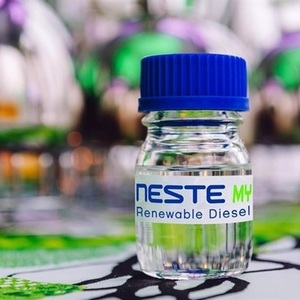Neste, PetroCard partner to expand access to renewable diesel

May 16, 2023
BY Neste Corp.
As part of its commitment to help businesses and cities reduce greenhouse gas (GHG) emissions from the transportation sector effectively, Neste on May 11 announced a new partnership with PetroCard, a premier commercial fleet fuel management solutions provider, to grow the accessibility of Neste MY Renewable Diesel in the Pacific Northwest region of the United States.
This partnership expands the availability of Neste MY Renewable Diesel to key locations in PetroCard’s network of commercial fuel stations in Oregon and offers commercial, state, and municipal fleet customers access to a lower-carbon alternative to fossil diesel.
“Partnering with PetroCard enables us to meet the growing demand for sustainable, lower-emission solutions from commercial and government entities in the region,” says Carrie Song, Vice President, Renewable Road Transport Americas at Neste. “There is no time to wait in the fight against climate change, and that is why we are working hard to bring more renewable diesel to the market to help cut greenhouse gas emissions from the transportation sector immediately.”
Fossil diesel is a huge contributor to the GHG emissions in the U.S. In 2021, about 46.82 billion gallons of diesel fuel were consumed in the U.S. transportation sector, resulting in the emission of 472 million metric tons of carbon dioxide (CO2). In contrast, the use of Neste MY Renewable Diesel, made from sustainably-sourced, 100 percent renewable raw materials, results in up to 75 percent* reduced GHG emissions over its life cycle compared to fossil diesel and when used in its neat form. Since Neste MY Renewable Diesel has a similar chemical composition to fossil diesel, it can be used as a drop-in solution today without investments into new vehicle fleets, modifications to the engines or the fuel distribution infrastructure. This enables municipalities and businesses to achieve their sustainability goals and create a healthier planet for both current and future generations.
Advertisement
Advertisement
“Our commitment to provide our customers access to innovative fuel solutions that create value and efficiency unequivocally includes offering products and solutions that contribute to a better, more sustainable tomorrow,” said Laura Yellig, President and CEO of PetroCard. “The expanded access to Neste MY Renewable Diesel reinforces that commitment to our customers.”
While this drop-in, more sustainable fuel solution will initially be offered at selected locations, Yellig anticipates that the preference and demand for renewable diesel will quickly resonate with fleets. “PetroCard is positioned to support fleets and businesses across the Northwest with this transition,” added Yellig.
Neste was one of the first companies to introduce renewable diesel into Oregon after the state adopted its Clean Fuels Program, and is positioned to supply renewable diesel into Washington and beyond.
In addition to GHG reductions, Neste MY Renewable Diesel also delivers strong performance, especially in cold weather. Because it does not contain sulfur, oxygen or aromatic compounds, it combusts cleaner. As a result, vehicles that run on Neste MY Renewable Diesel may require less maintenance.
Advertisement
Advertisement
Neste's current annual production capacity totals 1.14 billion gallons (3.3 million tons) of renewable products globally. The recent start-up of Neste’s expansion of its Singapore refinery and the joint venture with Marathon in Martinez, CA, will increase the total production capacity of renewable products to 1.9 billion gallons (5.5 million tons) by the end of 2023, and make Neste the only global provider of renewable diesel, sustainable aviation fuel, and renewable feedstock for polymers and chemicals with a production footprint on three continents. Please visit nestemy.com for more information about Neste MY Renewable Diesel and our distribution partners.
*) The GHG emission reduction percentage varies depending on the region-specific legislation that provides the methodology for the calculations (e.g. EU RED II 2018/2001/EU for Europe and U.S. California LCFS for the U.S.), and the raw material mix used to manufacture the product for each market.
Related Stories
Iowa farmers have a new market opportunity for their 2025 soybean crop. Landus is expanding its Clean Fuel Regulation initiative, made possible by recent policy changes expected to increase Canada's demand for liquid biofuel.
Topsoe, a leading global provider of advanced technology and solutions for the energy transition, has been selected as the renewable diesel technology partner for CountryMark’s Mount Vernon, Indiana refinery.
The U.S. exported 35,953.6 metric tons biodiesel and biodiesel blends of B30 or greater, according to data released by the USDA Foreign Agricultural Service on Aug. 5. Biodiesel imports were at 2,148.9 metric tons for the month.
XCF Global leverages Alfa Laval technology to enhance pretreatment capabilities at New Rise Reno facility
XCF Global Inc. on Aug. 5announced it leverages Alfa Laval Inc. pretreatment technology at its New Rise Reno biorefinery, a sustainable aviation fuel (SAF) plant located in Nevada. The pretreatment technology enhances feedstock flexibility at the plant.
U.S. Secretary of Agriculture Brooke L. Rollins on Aug. 1 announced the opening of a 30-day public comment period for stakeholders to provide feedback on the department’s reorganization plan, as outlined in the memorandum released July 24.
Upcoming Events










